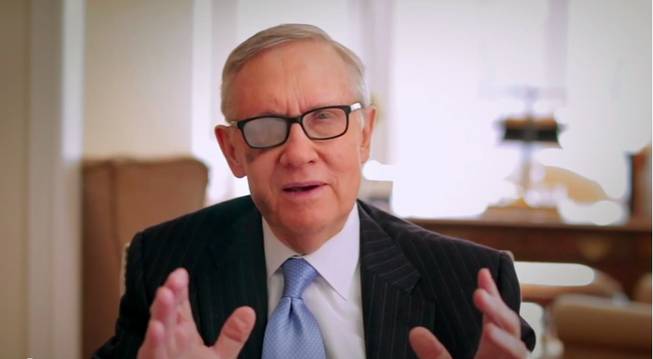
Courtesy of YouTube
Senate Minority Leader Harry Reid, D-Nev., announces his retirement in a YouTube video to his supporters Friday, March 27, 2015.
Tuesday, April 21, 2015 | 2 a.m.
When Sen. Harry Reid decided not to run for a sixth term to the U.S. Senate, the Nevada Democrat removed a big chore from his to-do list: raise millions of dollars for his re-election bid.
Reid raised more than $17 million in his 2010 defeat of Republican Sharron Angle. His 2016 campaign was shaping up to be one of the most competitive Senate races in history — and he didn't even have an opponent yet.
Now that the pressure's off, Reid still has about $1.5 million in his campaign account and another $100,000 or so of unused funds in his Searchlight Leadership political action committee.
The Sun combed through campaign finance rules and talked to political experts to find out what Reid could do with the money — and what he most likely will do with it. (Hint: The answer has something to do with ensuring his successor.)
Most Definitely Not An Option
There's a lot Reid could do with his campaign cash, but there's one thing he most definitely can't: use the money as if it were his own personal checking account. He can't buy a million-dollar home or new clothes or pay for his grandchildren's tuition, for example. That rule holds true regardless of whether Reid is a candidate.
Option One: Build the Harry Reid UNLV Public Policy Institute
For many departing lawmakers, especially ones who have been in public office as long as Reid, using campaign cash to build a policy institute at a home state university is a great way to ensure they're remembered long after the Washington headlines fade.
In Iowa, retiring Democratic Sen. Tom Harkin used some of the $2.4 million in his leftover campaign account in 2014 to establish The Harkin Institute for Public Policy and Citizen Engagement at Des Moines' Drake University.
The institute's homepage has a picture of Harkin looking rather scholarly and promises political science students an opportunity to advance "dialogue about the issues that define our public life … in a nonpartisan environment." It's also a great place for the senator to make post-retirement speeches.
But Harkin's decision was actually a source of tension between him and Reid. In the heat of the 2014 midterms, Politico reported that Reid wanted Harkin to skip the policy institute and instead help Democrats win the race for Harkin's replacement and keep control of the Senate. (Democrats lost both battles.)
With that bad taste in Reid's mouth, a policy institute isn't likely to be a serious consideration for him.
Option Two: Give it to charity
In a similar line of thinking, campaign finance laws allow Reid to give his money to any charity he wants. That could include religious organizations — Reid and his wife, Landra, are Mormons — national or international charities.
Reid has said he's not sure what he wants to do after the Senate. Establishing or donating to charities and policy institutes can give lawmakers the leverage they need to build their next career, said Darrell West, a campaign expert with the nonpartisan Brookings Institute.
"It's a terrific way to create goodwill for yourself," he said.
But Reid was Senate majority leader for eight years and is one of the most well-connected Democrats in the country. He probably doesn't need much goodwill to land his next job, so this isn't likely to be his top choice, either.
Option Three: Hold onto it
There's no hard limit on when Reid needs to empty his campaign bank account.
Some politicians have hoarded their cash for almost a decade: One former House of Representatives lawmaker, Marty Meehan of Massachusetts, left office in 2007 and still has $4.4 million in his campaign account. Former Sen. Evan Bayh, an Indiana Democrat who retired in 2011, is sitting on $10 million. The Federal Election Commission even allows candidates to invest their cash.
This option works best for younger candidates who may want to make another run at office. Reid will be 77 when he officially steps down in January 2017.
"I would guess Sen. Reid would want to put his money to quicker use," West said.
Option Four: Raise More Money
Which brings us to Reid's fourth and most likely option: Give the money to the person he wants to succeed him.
Ensuring a Democrat replaces Reid in the Senate is one of the senator's top priorities, and Reid has moved quickly to give his chosen successor the best shot at that. On the same day he announced his retirement, he lent his support to former Nevada Attorney General Catherine Cortez Masto. Masto announced her campaign less than two weeks later.
Unlike individual contribution limits, there's no limit on how much Reid's campaign account and related political action committee can give to candidates. So it's likely Reid will use his $1.5 million and probably raise even more money to help Masto and fellow Democrats in the state.
This is by far Reid's likeliest option, simply because pulling strings in campaigns is one of his favorite aspects of the job. And without his own campaign to worry about, Reid will have much more time to do it.

Join the Discussion:
Check this out for a full explanation of our conversion to the LiveFyre commenting system and instructions on how to sign up for an account.
Full comments policy